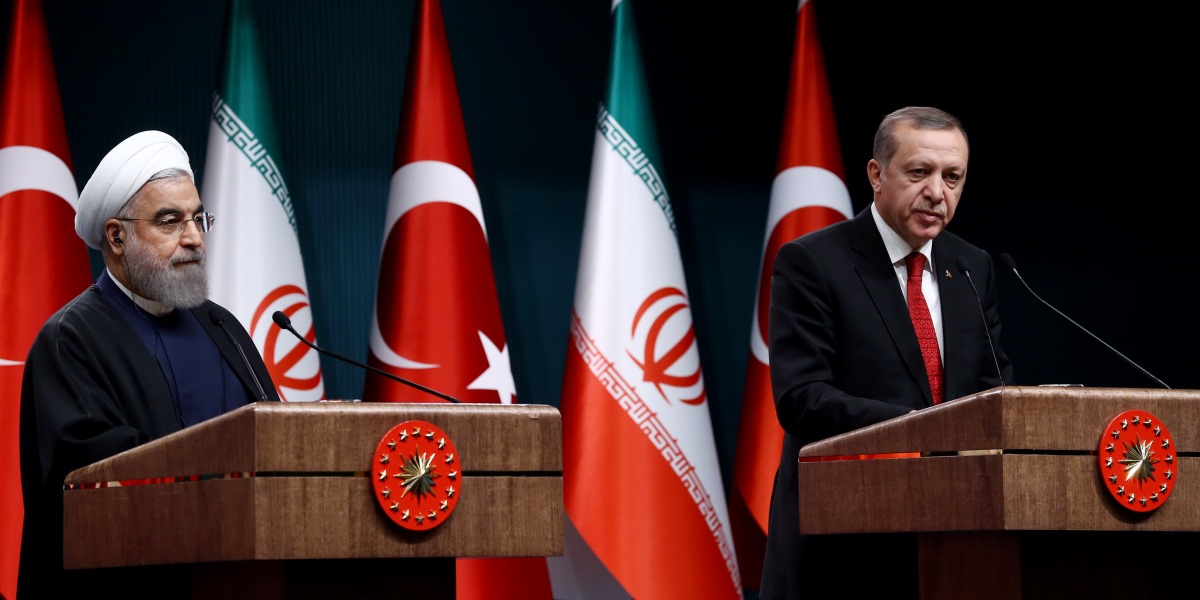
Is Turkey's Foreign Policy Axis shifting toward Eurasia?
Should we interpret the recent rapprochement between Ankara and Moscow or Tehran and Baghdad as a sign of Turkey's strategic axis shift toward Eurasia? Certainly not
Share
In an increasingly unstable, volatile and conflictual global system as well as its regional subsystems characterized by neo-Medieval dynamics of political fragmentation, endless frictions and shifting alliances, it sounds like an anachronism to talk about axis shifts in foreign policy. The foremost reason for this anachronism concerns the swift evaporation of formerly constant or roughly predictable alliance formations, foreign policy patterns and public-private spectrums. When it comes to post-9/11, post-Arab Spring Middle East, the microcosmos of all global rivalries and geostrategic conflicts, it sounds even more unrealistic to define specific axes that are supposed to predetermine the foreign policy behavior of the plethora of regional actors. As the region suffers from the impact of failed states, civil wars, ethnic-sectarian strife, constantly shifting shaky alliances, proxy conflicts, employment of paramilitary and terrorist groups by global powers and humanitarian disasters, no major actor on the ground is in a position to follow a stable path or long-term foreign policy axis. Hence, the age of the axes and axis shifts is long gone in the Middle East. In this context, endless axis shift arguments concerning Turkey's foreign policy preferences in the region are quite futile, but one could perfectly understand the strategic logic behind them. First, these arguments assume that there is, or there must be, a stable axis on which the basic parameters of Turkish foreign policy shall still rely. Defined in pure ideological terms in relation to Turkey's Westernization experiment since the 19th century, this axis is invariably defined on the sidelines of major Western actors (i.e. the U.S. and the EU). It is somehow assumed that the progressive path for Turkey's foreign affairs shall be based on taking positions next to Western actors regardless of the historical conjuncture, issue at hand or regional context concerned. Thus, every instance of friction with the U.S. and the EU, or collaborative effort with Russia or Iran, it has become a standard argument to state that Turkey is departing from the NATO alliance and experiencing an axis shift toward Eurasia.
Considering Turkey's political and economic maturation over the course of the last decade, as well as the development of reflexes to act as an autonomous regional power, this anachronistic definition fails to highlight real motivations for concrete foreign policy actions. But then the domestic axis shift debate in Turkey is not totally baseless, as there are ideological groups that argue that Turkey needs to align with Russia and Eurasian regional powers, rather than wandering around the margins of the Western alliance. So, shall we interpret the recent rapprochement between Ankara and Moscow or Tehran and Baghdad as a sign of Turkey's strategic axis shift toward Eurasia? Certainly not.
The historical background to Turkey's rapprochement with Russia via collaboration in energy and economic issues as well as the path to be followed for the resolution of the Syrian conflict has a lot to do with the collapse of the U.S. axis in the region. Since the Obama administration, the U.S. establishment preferred to follow a course of chaotic governance through which they tried to intermediate among warring factions in the Middle East. Pragmatic U.S. support for paramilitary and terrorist groups such as the People's Protection Units (YPG) in northern Syria was principally aimed at lowering the human and material costs of war for the Americans, but the lack of strategic direction and leadership in D.C. turned Syria and Iraq into neo-Medieval war zones.
Vladimir Putin was quick to notice the gaps in American regional strategy and played his hand perfectly to render Russia the most effective military and geostrategic player in Syria through massive deployments. From that point on, it was the only realistic choice for Ankara to work with Moscow for the resolution of the Syrian quagmire. Meanwhile, the Astana process, despite all its problems, crystallized as the only meaningful international attempt to secure peace in Syria. The real axis shift was being experienced by the U.S., the presumed leader of the free world, as successive administrations failed to produce realistic strategies for the future of Iraq and Syria.
Then came the referendum crisis in northern Iraq. As Masoud Barzani greatly overestimated his hand and took the abortive decision to push for an independence referendum, there were no strong warnings or serious pressure coming from the U.S. to deter him from this dangerous course. As the global power that invaded Iraq in numerous occasions under the precept of liberating the country, the U.S. failed again to show leadership for the preservation of stability. Then the stage was set for major regional actors, namely Turkey and Iran, to step in and advance their cooperation for the preservation of fragile peace in Iraq. Retrospectively, the Kirkuk operation realized by the Iraqi Federal Administration with the support of Tehran and approval of Ankara demonstrated that regional initiatives designed to protect peace and prevent ethnic-sectarian strife could stand a chance for success if there is an inclusive and egalitarian alliance structure.
Turkey's collaboration with Russia or Iran for that matter is purely rational, issue-based and respectful of national sovereignty spheres, rather than representing a romantic or ideological unity. To put it bluntly, Turkey is not categorically leaving the Western alliance or joining into a Eurasian alliance regime. Ankara is rightly following a pragmatic, flexible and adaptive foreign policy line in conjunction with rapidly changing regional dynamics. Interested foreign policy pundits are well advised to drop anachronistic axis shift arguments from their terminologies.
[Daily Sabah, October 27 2017]
Tags »
Related Articles







